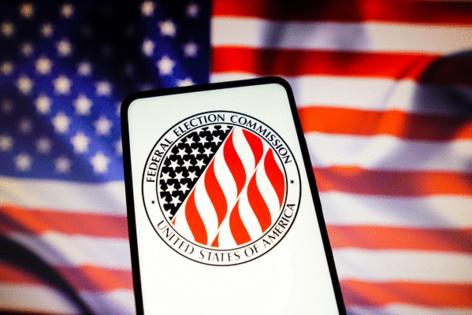FEC to consider clarifying what joint fundraising committees can pay for in political ads
Published in News & Features
WASHINGTON — The Federal Election Commission on Thursday will consider whether joint fundraising committees can fully finance campaign-style television advertisements, which Democrats argue could reshape funding for political advertising.
The Democratic Senatorial Campaign Committee, along with Montana Sen. Jon Tester’s reelection campaign and Arizona Rep. Ruben Gallego’s Senate campaign, asked the FEC earlier this month to “issue clear guidance on the utilization of joint fundraising committees to air campaign style television ads because we believe the Republican activity is illegal,” a DSCC aide said. Democrats argue that Republicans are exploiting a loophole by allowing TV ads that appear to advocate for a candidate or attack their opponent while also including a brief fundraising solicitation.
“If the Commission takes this position, there is nothing to stop federal candidates from fully offloading their entire advertising budget to national party committees and political action committees,” lawyers for the DSCC, Montanans for Tester and Gallego for Arizona wrote in comments last week.
Joint fundraising committees for Senate candidates in Maryland, Arizona, Montana and Nebraska have recently run ads attacking Democratic candidates and making a fundraising appeal.
The six-person commission, which is evenly split between Republicans and Democrats, is set to consider two drafts on Thursday that would clarify whether a joint fundraising committee could pay for an entire ad, or simply the part of it asking for a donation.
But the commission could also approve neither draft. By not issuing guidance on the legality of the actions, joint fundraising committees could in practice continue financing the ads, said Saurav Ghosh, director of federal campaign finance reform at the Campaign Legal Center, a group that filed its own comments that align with the Democratic arguments to the FEC ahead of Thursday’s meeting.
“The effect of a commission approval would be pretty big because that would basically give everyone the protection of the FEC saying this is legal,” Ghosh said. “The financial benefits to candidates would be very clear.”
But Ghosh said if the panel deadlocks, the legality remains uncertain and so both parties could take advantage of that.
“Overall the parties are always — they’re sophisticated — they’re looking for ways to maximize their candidates’ benefit,” he said.
If approved, a joint fundraising committee, a political committee that includes at least two political committees that join together to raise money, would be able to finance advertisements soliciting donations that could also appear as ads for a candidate.
Counsel for the National Republican Senatorial Committee argued that a 2007 ruling didn’t place any restrictions on joint fundraising committees advertising to raise money and said that joint fundraising committees, including Democratic presidential campaigns dating back to Barack Obama’s reelection in 2012, have run digital advertisements linked to donation pages or email sign-ups. The Harris Victory Fund is currently running digital advertisements with fundraising components, they say.
“All the JFC-sponsored advertisements described above were and should continue to be permissible — as should the Requestors’ proposed JFC television advertisements,” the NRSC’s comments read. “The FEC has never required that a JFC solicitation be boring or uninspiring to qualify as a solicitation, nor has the Commission placed any content restrictions on JFC solicitations in the form of TV advertisements or using any other medium to reach the public.”
©2024 CQ-Roll Call, Inc., All Rights Reserved. Visit cqrollcall.com. Distributed by Tribune Content Agency, LLC.







Comments